Results
-
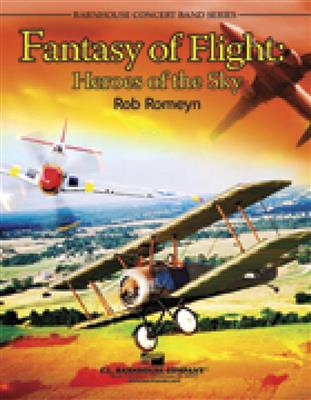 £91.99
£91.99Fantasy of Flight: Heroes Of The Sky - Rob Romeyn
This bold and epic programmatic work depicts in music the rich history of flight and its heroes. The work begins sensitively, with heartfelt emotion paying homage to heroes whose lives were lost. Then the music takes off on a spirited airborne adventure amid soaring musical themes and dramatic contrasts that are sure to impress. Following a dramatic climax, the bold and powerful ending will bring your audience to their feet. A stunning, important work to be enjoyed by bands and audiences alike.
Estimated dispatch 7-14 working days
-
 £83.16
£83.16Fantasy of Flight: Heroes Of The Sky
This bold and epic programmatic work depicts in music the rich history of flight and its heroes. The work begins sensitively, with heartfelt emotion paying homage to heroes whose lives were lost. Then the music takes off on a spirited airborne adventure amid soaring musical themes and dramatic contrasts that are sure to impress. Following a dramatic climax, the bold and powerful ending will bring your audience to their feet. A stunning, important work to be enjoyed by bands and audiences alike.
Estimated dispatch 7-14 working days
-
 £129.99
£129.99Ratatouille Satirique - Traditional
Erik Satie, born in Honfleur in Normandy (France) in 1866 is undoubtedly one of the most striking personalities in the history of French music. He composed in various, often quite divergent, styles. Besides light-hearted, entertaining works he also wrote several serious compositions, among which the three ballets: Parade, Rel che and Les Aventures de Mercure. However his piano pieces, such as Trois Gymnopdies or Gnossiennes will remain his most popular compositions. Satie co-operated with almost all great artists of his time: Pablo Picasso, Jean Cocteau, Sergej Diaghilev and Georges Braque and the composers Darius Milhaud (Le Groupe des Six) and Claude Debussy. Johan deMeij made an orchestration of three short pieces by Erik Satie: I. Prlude (from: Jack in the Box) II. Rverie (from: Trois petites pices montes) III. Marche: Le Piccadilly (1904) It was only after Satie's death in 1925 that the manuscript of the piano piece Jack in the Box was recovered. Satie himself thought he had lost the manuscript in a bus. When his flat in Arceuil was cleaned out, a small notebook was discovered behind his piano and it contained the manuscript which was assumed to be lost forever. The Rverie (De l'Enfance de Pantagruel) is an extract from Trois petites pices montes, originally composed for small symphony orchestra. In this suite it is meant as a restful intermezzo. It is clear that, as with Milhaud (La Cration du Monde) and Debussy (Golliwogg's Cakewalk; Le Petit Ngre), it is hard to deny obvious influences of jazz music in Erik Satie's compositions. Le Piccadilly, dating from 1904, displays a lot of similarities with the compositions of Scott Joplin.
Estimated dispatch 7-14 working days
-
£87.50
Arabia - Joseph Benjamin Earp
"Arabia" is based on the legend of Atlantis, a lost city in ancient Arabia. This mysterious city was buried under the sand after being destroyed by natural disasters said to be unleashed by angry Gods. Many explorers seeking the lost city believe it is near the southern deserts of modern-day Saudi Arabia. Sit back and imagine you are transported back to this amazing ancient city.
Estimated dispatch 7-14 working days
-
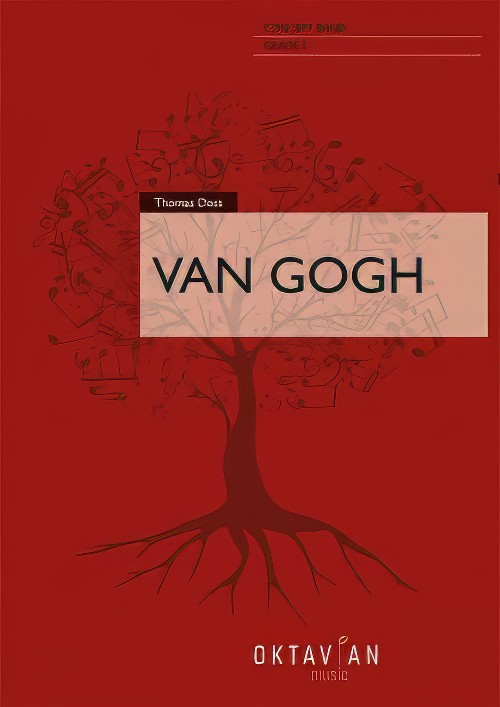 £279.99
£279.99Van Gogh (Concert Band - Score and Parts) - Doss, Thomas
This composition is not a work inspired by the life of the famous painter, but rather an attempt at a pictorial immersion into his world. In addition to Van Gogh's character and tragic life, the technique he employed to create his works, the bright colours of his paintings and his view of nature served as inspiration for this musical work. Point by point, stroke by stroke, Van Gogh brought his own world to life on canvas.On the life of Van Gogh: The Dutch artist Vincent van Gogh was one of the most important pioneers of Modernism, despite being relatively unknown during his own lifetime. As an artist, he chose a life of poverty and seclusion. From today's perspective, his important woks were created from 1880 onwards, when he had already more or less succumbed to madness. While his earlier works could still be classed as contemporary, he matured into a pioneer of Expressionism with his later work indicating an increasing self-awareness. He was just 37 years old when he died but he created over 750 paintings and 1600 drawings in the last ten years of his life.The structure of the work:Start: Brushes and Paints: Van Gogh retired to Arles in southern France where he found his artistic home. The colours and flowering gardens of this landscape awakened in him an unbelievably great creative power.A: A Picture Comes into Being: Van Gogh's psychotic episodes and bouts of depression did not stop him from painting wonderful pictures. Hardly anyone recognised his genius during his lifetime, on the contrary, he often felt misunderstood.C: Paris - Arles: In Paris (from 1886), Van Gogh became inspired by the French art scene. His works found few takers, however. He met and befriended the painter Paul Gauguin, but the lack of success made Van Gogh short tempered, and he began to drink. Eventually, he moved from Paris to Arles in the south of France to establish an artists' collective with Gaugin. Within a few weeks, the two got into such a violent argument that Van Gogh attacked his friend with a knife. The friends parted ways and afterwards Van Gogh cut off his right ear. In 1889 he voluntarily admitted himself into a mental hospital at St. Remy, suffering from hallucinations and fearing that he would lose his mind.G: The Starry Night One of his most famous paintings, created in 1898.H: Death and Brotherly Love Vincent van Gogh accepted an invitation to Auver-sur-Oise in 1890. This was one of his most intensive creative periods. He also went there for treatment, but his mental state hardly improved. After an extended walk, he injured himself fatally with a pistol under mysterious circumstances. Not even to his beloved brother Theo, who had supported him all his life, did he reveal on his deathbed how the accident had occurred.J: Art Market Today, Van Gogh's paintings are among the most expensive paintings on the art market. How ironic, given that he could hardly sell a painting during his lifetime. "I put my heart and soul into my work and lost my mind in the process." (Vincent van Gogh)Duration: 13.15
Estimated dispatch 7-14 working days
-
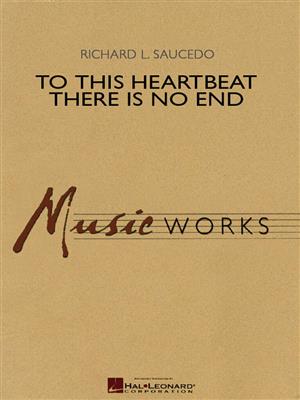 £79.99
£79.99To This Heartbeat There Is No End - Richard L. Saucedo
In one form or another, Hurricane Katrina affected all our lives. In the fall of 2005, the Mississippi Bandmasters Association commissioned Richard Saucedo to write this work for wind band. In the words of the composer, this is a tribute to those who lost their lives, to those who saved lives, and to those who continue to persevere in the aftermath... A wealth of musical effects-from the timpani heartbeat to the fury of the storm to the sense of determined optimism-all contribute to make this an unforgettable concert experience. Includes extensive percussion scoring as well as piano and optional harp. Dur: 6:00 (Includes Full Performance CD)
Estimated dispatch 7-14 working days
-
 £104.99
£104.99Song of Hope - Jan Van der Roost
2011 was a disastrous year for Japan: on March 11 the northeast of the country suffered a violent earthquake, which triggered a huge tsunami and caused massive damage to people and the environment. The ensuing problems with the nuclear reactor atFukushima only increased the misery: a black day in the country's history...One almost inevitable consequence of such dramatic circumstances is the particular damage suffered by the cultural arts. And so it was in Japan: various high school wind orchestras in the effected areas lost their practice rooms and/or instruments.It will take a long time before the damage suffered is repaired - and it will take great effort to overcome the psychological effects, too. Focusing on the latter, Yutada Nishida (director of The Bandwagon radio program) asked a few composers fora simple work that could be played by many orchestras. It just so happened that the Osakan Philharmonic Winds (with whom Jan Van der Roost had conducted a concert exclusively of his own works on September 25th) had had a similar idea. This concert saw the baptism of Song of Hope. This pieceimmediately struck a chord with musicians and audience alike: it begins bleakly in the low register and evolves to a more open, optimistic close. There really is hope for better times!
Estimated dispatch 7-14 working days
-
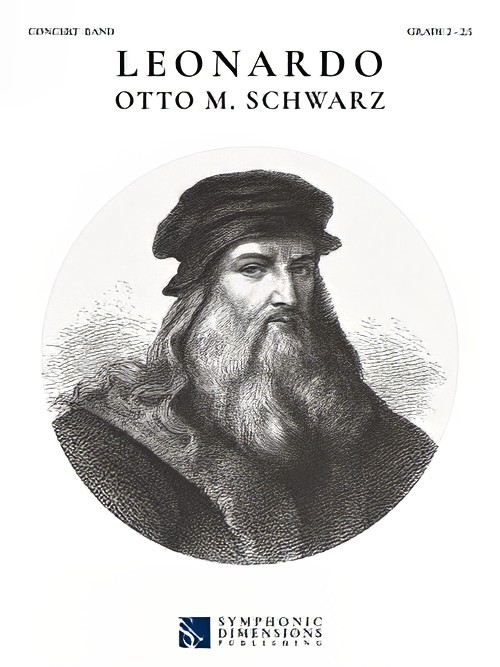 £78.50
£78.50Leonardo (Concert Band - Score and Parts) - Schwarz, Otto M.
Leonardo da Vinci (1452-1519) was a painter, sculptor, inventor, philosopher and researcher. He is renowned as the original 'Renaissance Man'. 'I will preserve the memory of myself in the minds of others' was one of his maxims. Among his most famous works of art are the Mona Lisa, The Last Supper and the Vitruvian Man. He left an extensive collection of handwritten documents in his notebooks. These books, known as codices, survive in various volumes such as the Codex Atlanticus, Codex Madrid, Codex Trivulzianus etc.). They include sketches of ground-breaking inventions as well as studies and commentaries which span the gamut of human study. The left-handed da Vinci wrote the texts in mirror writing. Through wars and other upheavals, the documents were scattered throughout Europe and much of his work disappeared. Leonardo da Vinci wanted to leave a kind of encyclopaedia for posterity and, although it is estimated that up to 80% of his manuscripts were lost, some 6,000 individual documents survive to this day, the contents of which in many cases were only understood centuries later.Duration: 6.00
Estimated dispatch 7-14 working days
-
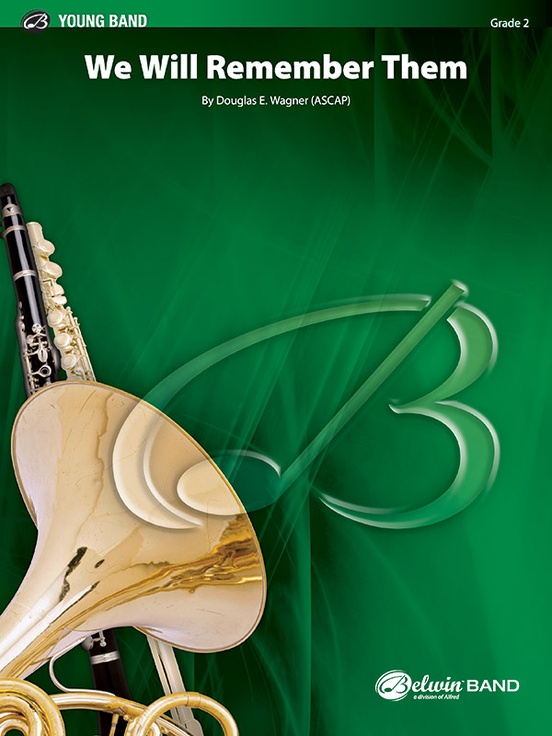 £56.50
£56.50We Will Remember Them (Concert Band - Score and Parts) - Wagner, Douglas E.
The worldwide pandemic of 2020 left in its wake devastating numbers of lives lost, resulting in unspeakable suffering for families coping with the grief for their now absent loved ones. This is especially true for the first responders, frontline personnel, doctors, nurses, scientists, medical support teams, and healthcare staff members whose selfless dedication and devotion to caring for others tragically resulted in their own passing. Guided by their personal, deep sense of duty and obligation to heal and help, they put themselves in harm's way, paying the ultimate price so that others might live. Celebrate their lives with Douglas Wagner's composition, We Will Remember Them. May their bright stars ever spread the night sky, piercing the darkness to continue bringing light, hope, and inspiration to us all. At the going down of the sun and in the morning, we will remember them. Duration: 3.15
Estimated dispatch 7-14 working days
-
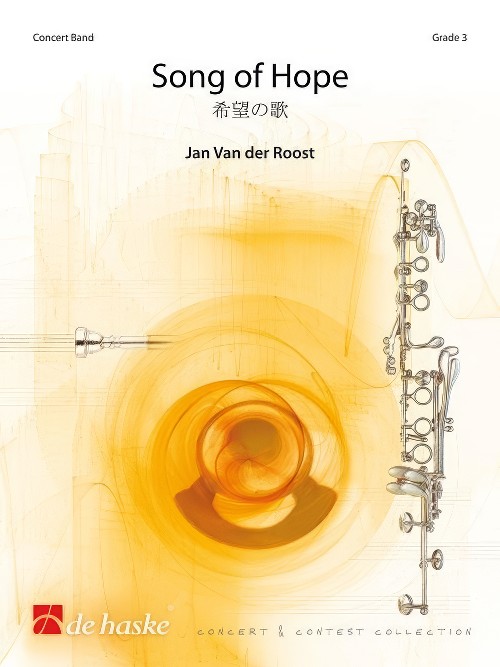 £104.99
£104.99Song of Hope (Concert Band - Score and Parts) - Van der Roost, Jan
2011 was a disastrous year for Japan: on March 11 the northeast of the country suffered a violent earthquake, which triggered a huge tsunami and caused massive damage to people and the environment. The ensuing problems with the nuclear reactor at Fukushima only increased the misery: a black day in the country's history... One almost inevitable consequence of such dramatic circumstances is the particular damage suffered by the cultural arts. And so it was in Japan: various high school wind orchestras in the effected areas lost their practice rooms and/or instruments. It will take a long time before the damage suffered is repaired - and it will take great effort to overcome the psychological effects, too. Focusing on the latter, Yutada Nishida (director of The Bandwagon radio program) asked a few composers for a simple work that could be played by many orchestras. It just so happened that the Osakan Philharmonic Winds (with whom Jan Van der Roost had conducted a concert exclusively of his own works on September 25th) had had a similar idea. This concert saw the baptism of Song of Hope. This piece immediately struck a chord with musicians and audience alike: it begins bleakly in the low register and evolves to a more open, optimistic close. There really is hope for better times!Duration: 4:45
Estimated dispatch 7-14 working days
